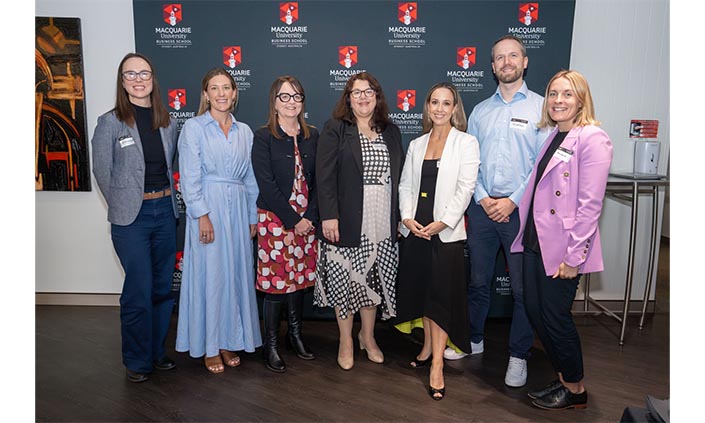Embracing Change: The future of work
What will the future of work look like and how do we position ourselves to succeed within that?

That is the question industry and academia thought leaders tackled at Macquarie Business School’s 2025 Employability Summit.
Embracing and preparing for change
The event opened with an inspiring framing from Macquarie Business School’s Executive Dean Professor Leonie Tickle, who highlighted how quickly the nature of work is evolving and the importance of preparing our students for these changes.
“We are in the midst of transformational change, driven by technological advancements, shifting workforce expectations, demographic transition and global uncertainty,” she explained.
“Artificial intelligence and automation are reshaping industries not just in how we work, but in what work is. Entire job categories are evolving and entirely new roles are emerging at a pace that traditional education systems are struggling to keep up with. The very nature of work is shifting.”
Professor Tickle reflected that education has never been more crucial in being a key driver of transformation, empowering individuals to adapt and thrive in the face of change.
“For education to maintain its role as a tool for transformation, the way that universities educate must, of course, evolve. And we must be very conscious of preparing our students for a lifetime of change themselves,” she said.
Professor Tickle emphasised that there was a need now, more than ever, for universities to embed experiential learning through internships, apprenticeships, industry partnerships, and to equip students with adaptability and resilience, so that they can navigate uncertainty with confidence.
The importance of values to grads
Australian Association of Graduate Employers (AAGE) CEO Shanan Green gave an interesting keynote, sharing insights from research conducted on what attracts interns and graduates to an organisation.
“To this generation, that doesn't think they're probably going to be able to save and buy a home… they're going to be thinking about the values of development, the values of inclusion, of wellbeing, ahead of monetary compensation,” said Shannan.
Access to colleagues, supports and systems that allow them to be their authentic self at work, and projects or work that align with their values were all high on their list.
How AI could steal our critical thinking
Next on the agenda was a panel, moderated by Associate Professor Sarah Bankins, on the themes of AI and automation, workplace flexibility, and inclusive hiring practices. The line up featured speakers from a range of backgrounds including Executive Director Carly Wilkinson from Symmetra, Head of Marketing Jade Lish from v2 Food, Senior Executive, Health, Culture & Performance at Medibank, Kately Reddin.
Head of AI at Macquarie University, Phil Laufenberg was also on the panel and made a sobering but important observation on the reliance of AI.
“Accessibility to AI models has never been higher than it is today. But if we over rely on it and we don't learn how to use it properly, what our minds will do is go back a hundred years and lose the critical thinking, lose the innovation capability,” explained Phil. “We'll lose to the ability to think for ourselves and develop our minds into things that can be adopted, that can look at things that the AI tells us to say that's not right.”
Industry and education collaboration = student success
Attendees moved into a focus session, with conversations around job readiness and how industry and education can strengthen their connection to produce graduates of the future and build a solid talent pipeline.
The event concluded with inspiring case studies from current partners and students to showcase the excellent work that is already happening in this space. Macquarie Business School student Vanessa Ngo summed it up extremely well when she reflected on her internship experience.
“I learned that it's not just about doing the work because I'm told to do the work, but also doing the work for the betterment of the project. To really understand the context of what I'm doing and what value it brings to, not only myself, but to the firm and the task,” Vanessa said. “And I think that really redefined, my perspective of what it means to be curious and having no boundary to curiosity. And so, as you can see, my placement has taught me a lot.”